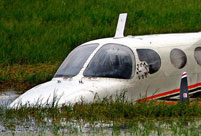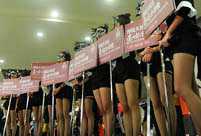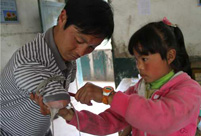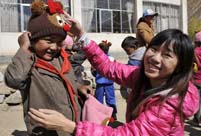III. Political Progress--the People Are the Masters of Their Own Fate
Democratic reform and regional ethnic autonomy lifted Tibet out of the old state of feudal serfdom under theocracy and put in place the systems of people's congress and regional ethnic autonomy, under which people of all ethnic groups in Tibet have become the true masters of the country, society and their own fate. With the development and improvement of socialist democracy around the country, Tibet has seen its democratic system growing sounder, forms of democracy becoming more diversified, and channels for orderly political participation being expanded.
Establishing the system of people's congresses
The system of people's congress is a fundamental political system of China that ensures the people's right to be the masters of the country. Under this system the Chinese people exercise state power through the National People's Congress (NPC) and local people's congresses at different levels. In September 1965 the First Session of the First People's Congress of the Tibet Autonomous Region was held in Lhasa, marking the formal establishment of this system in Tibet. Tibet's administrative, judicial and procuratorial organs are all created by the regional people's congress to which they are responsible and by which they are supervised. Major regional affairs are decided by the regional people's congress. Tibet's administrative organs carry out the laws, regulations, rules, resolutions and decisions adopted by the regional people's congress. Through deputies to the people's congress at different levels, people in Tibet exercise their right to manage state and regional affairs. All Chinese citizens living in Tibet who are 18 years old or above, regardless of gender, occupation, family background, ethnicity, religious belief, educational background, financial conditions or length of residence in this region, enjoy the right to vote and the right to be elected. People of all ethnic groups in Tibet directly elect deputies to the people's congresses at the county (district) and township (town) levels, and these deputies then elect deputies to the regional people' s congress and to the NPC. The Moinba and Lhoba ethnic groups, despite their small populations, both have their representatives at the NPC and local people' s congresses at all levels in Tibet. During elections at the regional, prefecture (city), county (district) and village (town) levels, the voter turnout rate has grown steadily over the years. In the 2012 elections at these four levels the voter turnout rate exceeded 94 percent.
Deputies of Tibetan and other ethnic minorities make up the overwhelming majority in the local people' s congresses at all levels. In 2012, among the 34,244 deputies elected directly and indirectly at these four levels, 31,901 were from the Tibetan, Moinba, Lhoba, Naxi, Hui, Zhuang and other ethnic minorities, accounting for more than 93 percent. Among the present NPC deputies, 20 are from the Tibet Autonomous Region, of whom 12 are from the Tibetan ethnic group, one each from the Moinba and Lhoba ethnic groups. Among the 44 members of the standing committee of the tenth regional people's congress, 25 are from the Tibetan and other ethnic minorities; among the 14 chairpersons and vice-chairpersons of the standing committee, eight are from the Tibetan and other ethnic minorities. Women have also seen their social status raised markedly. Female deputies make up 25.4 percent of the total to the Tibet regional people' s congress, while women make up 34.49 percent of all civil servants in governments at all levels.
【11】 【12】 【13】 【14】 【15】 【16】 【17】 【18】 【19】 【20】
【21】 【22】 【23】


 No news of survivors in Lao Airlines crash
No news of survivors in Lao Airlines crash Five fighters in flight training
Five fighters in flight training London mayor hails free trade, subway system on China tour
London mayor hails free trade, subway system on China tour Different eye catching shows at housing fairs in China
Different eye catching shows at housing fairs in China Chalk it up to great courage
Chalk it up to great courage Tibetan girl helps mobilize volunteers onlin
Tibetan girl helps mobilize volunteers onlin Lingerie show dazzles Wuhan Motor Show 2013
Lingerie show dazzles Wuhan Motor Show 2013  Chinese screen goddesses from Beijing Film Academy
Chinese screen goddesses from Beijing Film Academy  Weekly Sports Photos
Weekly Sports Photos Bayi Parachute Team of PLA Air Force
Bayi Parachute Team of PLA Air Force World has never been dark-- a blind kid’s life in Tibet
World has never been dark-- a blind kid’s life in Tibet Change to law may make it easier to sue polluters
Change to law may make it easier to sue polluters UNESCO world heritage site: Montale Tower
UNESCO world heritage site: Montale Tower U.S. Senate leader announces bipartisan deal
U.S. Senate leader announces bipartisan deal Fiber-optic wedding dress show shinning in Suzhou
Fiber-optic wedding dress show shinning in Suzhou Day|Week|Month